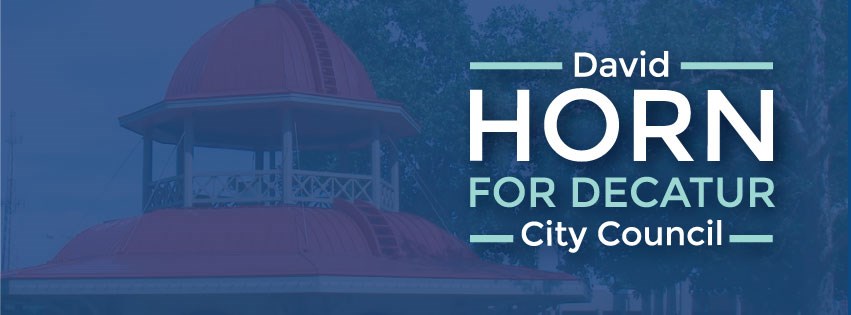
Racial disparities in Decatur and the possible impact of council decisions regarding cannabis
Based on the discussion at the December 16 city council meeting, there is an opportunity to discuss current racial disparities in the city and how these disparities could be impacted by recent council decisions regarding cannabis.
CURRENT RACIAL DISPARITIES IN DECATUR – The National League of Cities defines racial equity as “’Closing the gaps’ so that race does not predict one’s success, while also improving outcomes for all.” The City of Decatur does not have racial equity, and has been ranked as having among the highest levels of racial disparities in the U.S. Based on 2016 data from the U.S. Census Bureau’s American Community Survey, median income for black families was $21,871 (below the poverty threshold for a family of four) compared to $51,662 for white families, black unemployment was 21.7% compared to 7.4% for whites, and black homeownership rates were 36.4% compared to 75.9% for whites (it should be noted that unemployment rates have decreased considerably since 2016). Racial disparities are unacceptable, and the city council can take the lead in implementing policies that foster equitable relationships and racial equity such as the Minority Business Enterprise ordinance.
CANNABIS AND A DUI ENFORCEMENT OFFICER – In recent weeks, the city council has made numerous decisions regarding cannabis and most recently the Decatur City Council approved a grant for a DUI Enforcement Officer (I voted for the officer). In the rationale provided by the city, the legalization of cannabis and subsequent increase in cannabis-related DUI cases was mentioned as a reason for having a DUI enforcement officer. In and of itself, it could be argued, and I agree, that a DUI Enforcement Officer is completely independent of race. After all, how would a police officer know the racial identity of an impaired driver prior to stopping them and no one wants to be on the road with an impaired driver regardless of the impairment.
With that said, cannabis-related crimes have disproportionately impacted Black Americans compared to White Americans. For example, Black Americans are disproportionately more likely than white Americans to be arrested for cannabis possession. Moreover, the state of Illinois determined that a large area of Decatur has been disproportionately impacted by past cannabis enforcement with higher rates of arrest, conviction, and incarceration for cannabis along with high poverty. Thus, when the city uses the legalization of cannabis as partial justification to the council for the need for a DUI Enforcement Officer, as opposed to the two recent, tragic deaths involving DUI of underage drivers, it unnecessarily raised concerns regarding the rationale.
THE IMPORTANCE OF CITY COUNCIL POLICY THAT PROMOTES POSITIVE RELATIONSHIPS WITH POLICE - As the policy making body of the city of Decatur, it is the city council’s responsibility to ensure that policies, programs, and ordinances are free of institutional and structural racism (and do not erect barriers to escaping poverty). From that perspective, I worry that if the council creates unintentionally or inadvertently institutionally racist policies that we will negatively impact our citizens and put police officers in a position to enforce unequitable public policy. For example, at one point in time, city policy called for the towing of vehicles after the first offense for noise violations, a policy that may have disproportionately impacted Black Americans (the policy has since been changed).
Personally, I am concerned that the city council’s decisions to prohibit cannabis dispensaries, prohibit other cannabis-related businesses, and prohibit public consumption in tobacco shops, makes access to legal cannabis more difficult. In turn, will this result in individuals with fewer means to make illegal purchases of cannabis and exacerbate racial disparities as it pertains to cannabis? How is the safety of cannabis users impacted, particularly lower income individuals, when they do not have access to a legal, regulated product? Could the sales tax revenue from a dispensary and property tax revenue from other cannabis-related businesses have been invested in neighborhoods where there are currently large racial and economic disparities in an effort to turn around delipidated neighborhoods? Ultimately, the city council should want interactions between the police officers and the public to be positive ones, and council policy can play a significant role in making sure this is the case.
IN SUMMARY – Lack of conversation about racial disparities is not a solution to resolving them. In fact, the opposite approach is needed – There is a need for the Decatur City Council to have more open, transparent, and what is likely to be uncomfortable dialogue. Conversations should be followed by identifying and removing structural barriers to achieving racial equity.
The National League of Cities Race, Equity, and Leadership (REAL) Initiative provides trainings for cities and may be a good starting model for Decatur. Ultimately, the council should be a leader in approving policies that can reduce the racial disparities that we have and put us on a pathway to racial equity. The pathway begins with conversation.
